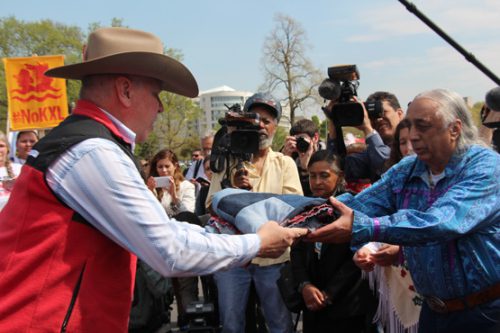A Friendly Reminder reflection from QLC
By Andy Stanton-Henry
Do you ever say something and immediately wish you could take it back? Extra points if you’ve done so while leading from a stage. Well, I had one of those moments recently.
During our joys and concerns time at my meeting, a Friend shared about a respite ministry that just started at the nearby United Methodist church, which supports both care-givers and care-receivers in local families. I was happy to hear of this much needed ministry but also felt my compulsion to be hilarious pushing it’s way up. I thought to myself “This is not the time to say this” but sleeplessness eroded the filter so I said it anyway. I told the woman, with a straight face, “I’m sorry, we can’t promote any ministries from other churches.”
The look on her face was utter shock, and she wasn’t alone. For the first time in my life, I was a believable liar and the whole meeting seemed to be questioning the welcoming, family vibes they had previously felt at the church. The seconds felt like hours but I quickly clarified that I was teasing and we are overjoyed to hear of this new ministry. The room erupted with laughter – the laughter of relief.
The truth is, I’m a big believer in partnership and collaboration, whether it’s with Methodists, Muslims, or “those other Quakers.” At QLC, Della and I joke about inviting people to sign a “non-compete clause” for ministry. Not for legal purposes but for kingdom purposes.
I appreciate the perspective of Peter Greer who says we should “root for our rivals.” He challenges us to ask ourselves a couple critical questions: “What distinguishes generous and openhanded leaders is how they answer these two questions; ‘Do we believe in a world of scarcity or abundance?’ And ‘Is our focus on our clan or the kingdom?’”
The further along in life and leadership I get, the more central those two questions become for me. If you know me at all, you know I like to invite people to take an “abundance perspective.” And, while you may or may not identify with “kingdom language” (insert “commonwealth” or “movement” if you prefer), I think we all need to reframe our work in terms of the Great Project that Friends have called the “Peaceable Kingdom.”
As we’ve discerned and developed the work of QLC, I’ve also been guided by the image of the “Quaker ecosystem.” Our job isn’t to compete with other expressions of Life in our ecosystem, but to contribute to the ecology by finding our niche and community.
A slight nuance here: a little bit of healthy competition is a good thing. Ecosystems are strengthened by competition. Leadership guru Simon Sinek talks about “worthy rivals.” Worthy rivals can be a good thing. They encourage us to address our weaknesses, lean into our strengths, and adapt more effectively. Part of “rooting for rivals” may mean letting our worthy rivals challenge us to improve and adapt.
From time to time there may be a rival in our life and leadership that is not “worthy” and we need a different approach. And not every good person makes a good partner. But much of the time we all get better by rooting for rivals and collaborating in every way possible. We are simply too small to keep competing and our missions are too important to be hampered by pettiness and self-protection.
When the cause is worthy, it’s amazing who we can find common cause with. In the United States, one of the most archetypal “rivalries” is “Cowboys and Indians.” But in 2013 a group of rural white ranchers and Native American leaders formed the Cowboy-Indian Alliance because they shared common concern for the exploitation of their homelands in Nebraska and South Dakota. They prayed, protested, and protected together to stop the Keystone KL Pipeline.
Do you have concerns and leadings that are important enough to get you out of your clan and into the kingdom to find “unlikely allies”?
Do you have any “worthy rivals” that are challenging you to improve and adapt?
Are you being called to “root for rivals” by risking a new relationship or partnership that could heal and enliven the Quaker ecosystem?

“People need to be reminded more often than they need to be instructed.”
– Samuel Johnson